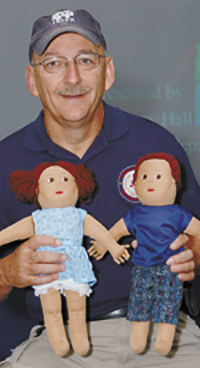
Terry Hall has spent 23 years educating communities, parents and students of all ages about preventing child sexual abuse. The sergeant with the Indianapolis Police Department developed the age-specific “Body Safety” programs after seeing apprehension of molesters wasn’t doing enough to protect children. The tools in his hands, anatomically-correct people figures, are used to show students the correct names for private parts of the body during his talks. Photo by Richard G. Biever
Indiana’s electric cooperatives talk a lot about “community commitment.” That commitment runs deeper than just providing electricity and services or promoting festivals and economic development. True commitment supports the good; it confronts the bad. This month, Electric Consumer looks at a program dedicated to preventing the sexual abuse of our children that’s available to communities. Child sexual abuse is a topic we wish we wouldn’t need to cover, but this horrible, shadowy crime occurs in every community. Ignoring it only appeases the abusers and — what’s worse — harms our children even more.
Program helps communities protect children from molestation
Lori had a secret eating her up inside. Only the fifth grader and her mom’s boyfriend, David, knew. For months, when her mom left her alone with him, he had been sexually molesting her.
Lori (not her real name) tried to tell her mom. But whenever she worked up the courage, her mom seemed too busy fixing dinner or caring for her two little brothers. So Lori said nothing. David, afterall, was supporting their family and was going to be her new dad.
Lori’s mom moved them to the suburban Indianapolis county to start a new life after Lori’s father had died. The family had a hard time making ends meet until David entered the picture.
Then one day at school, she and the rest of her classmates assembled in the gymnasium for a safety program unlike any they’d heard before. For half an hour, the man presenting it kept their attention as he talked about “Body Safety.” He said some adults have their thinking messed up. Some adults — strangers and even people the students might know and love — think they can touch children anywhere they want for no good reason. He assured the students that sexual abuse was never their fault, and if it was happening, they should tell a trusted adult. He said people were there who cared about them, would listen to them and would help them if anything like he talked about was happening to them or someone they knew.
Then slips of paper, printed with the words “yes” and “no,” were passed out to all the students. They were asked if they wanted to talk to someone in private about what they’d heard there that day. Lori first circled “no.” She was too nervous to tell. But then, thinking about what the man said, that it wasn’t her fault, she erased it and circled “yes.” She wrote her name and handed the slip of paper to her teacher.
The next day, the school counselor asked to speak to Lori. Lori then revealed what David had done. The police and county child services were called. When Lori’s mom came to the school to get her and her brothers, authorities told her mom. She was shocked by the news. When David entered the room to see what was taking so long, he was arrested. He later was tried and convicted. Lori testified against him.
Lori’s mom later told the local newspaper she never imagined this could have been going on right under her nose and with the man she loved. Lori and her mom went through counseling together and became closer. Though Lori said later she no longer dwells on the memories of what David did, it’s something she’ll always carry in the back of her mind.
Lori’s mom also added she didn’t think Lori would have spoken up if not for the Body Safety program.
Protecting through empowerment
Sadly, stories like Lori’s are repeated everywhere. They’re repeated in cities, suburbia, and even small close-knit communities and rural areas. They are stories of adults — family friends, beloved relatives and kindly strangers — who prey on children and rob them of their innocence. Sadder still are the stories that never get told because young victims are never taught how to tell “good touches from bad touches,” and how to tell someone they’re being molested. They are never taught that it’s not their fault and that they shouldn’t be ashamed to talk.
After the same Body Safety program was presented in age-appropriate sequences to the entire student body at Orange County’s three school systems over the past two autumns, almost 70 students of all ages came forward seeking help for themselves or someone they knew. “The school systems and the communities were shocked,” said Darlene McBride, the family case manager supervisor for the state’s Department of Child Services in Orange County.
No one imagined the number of children affected would be so large for so small a county. “We see this as a serious concern for everyone,” McBride said.
The Body Safety program is presented by child abuse expert Terry Hall, a sergeant with the Indianapolis Police Department. He started developing it in the early 1980s while still with the child abuse unit of IPD. Today, on his own time, he travels across the state and country teaching children, parents, educators and law enforcement how to prevent child sexual abuse. “Protecting through empowerment” is how he defines the Body Safety program.
“It’s a very, very powerful issue,” he said. “And this program is very, very powerful. I don’t take that for granted.”
He said when he first developed it, he didn’t think he could even present it. But after the first presentation at an Indianapolis school, 15 children who had been molested by the school custodian came forward. “I didn’t realize how many people were out there,” he said.
Hall’s Body Safety program was brought to Orange County through cooperation of the county’s Child Services office, Prevent Child Abuse Orange County and the county’s three school systems. It was funded through a grant from Orange County REMC’s voluntary consumer community fund, Operation Round Up.
“There seems to be many, many needs … more needs than dollars,” said Steve Ralston, board president of Orange County REMC’s Round Up fund. “But this program seems to be a perfect fit for these dollars. There’s a need for his talk in our schools.”
“I don’t think myself, or people who know 10 times more than me, will ever understand the true devastation this is doing to our children,” Hall said of child molestation. He said victims carry it inside them all their lives. It’s like an acid that eats away at them. These children grow up scared and scarred. They carry the pain inside them — into adulthood and their relationships and careers, and even into their senior years.
In a thank you letter to Orange County REMC last November, he wrote, “I don’t write many letters like this because not too many companies feel that it’s their place to get involved. Thank God, Orange County REMC members, who participate in Operation Round Up, understand that our children are truly our nation’s greatest resource.”
“I wish he talked and absolutely nothing happened,” added Ralston, an Orange County REMC consumer. “But unfortunately, it’s not like that. We might want to hide our heads and avoid the problem, but I think we’re doing the right thing to provide some assistance to him and invite him back.”
Another Orange County Operation Round Up grant made just last month will bring Hall back to Orange County’s elementary schools sometime during the upcoming school year.
“This has to be an ongoing thing,” noted Tonia Hedge, president of Prevent Child Abuse Orange County. She said children need to know it’s OK to talk openly about the serious subject of Body Safety. “If you don’t talk about it like some taboo subject, then they won’t think about it like a taboo subject.”
Hedge, also an Orange County REMC consumer, added, “The people who perpetrate these things against children count on the fact we don’t like to discuss uncomfortable subjects.”
“It’s just something we don’t want to talk about, and there’s one person extremely happy,” said Hall. That one person is the child molester.
Body Safety
Terry Hall is a 37-year veteran of the Indianapolis Police Department. He’s now with the water rescue unit. He developed the Body Safety program in the early 1980s when he was with the child abuse unit investigating sex crimes.
Though he’d won the IPD “Officer of the Year” for his arrests and convictions, he said he couldn’t hang the award on his wall. He was too devastated by the light sentences the courts gave to the molesters he caught. Children weren’t being believed in the courts and, with sexual abuse, rarely was there hard physical evidence.
“I realized apprehension is not working,” Hall said. “You have to go for prevention.”
He then began developing the program to prevent abuse and identify abusers. Over the years, he changed the title from “Good Touch, Bad Touch” to “Body Safety” to go with other school programs like “bus safety” and “fire safety.” And, he noted, not all good touch, like from parents and doctors, feels good. He wanted to clarify that in the minds of the students.
To develop the program, he talked to teachers and prosecutors. He talked to abuse victims and pedophiles. He interviewed hundreds of convicted molesters over the years. One thing he asked was how they got their victims to stay quiet.
“I expected them to tell me, ‘we’ll kill their parents; we’ll kill their dogs, we’ll do this, that,'” Hall said. “They don’t even threaten kids. They said, ‘We don’t tell kids not to tell about child molesting. You do.'”
The revelation hit him like lightning. That’s why Hall believes it’s imperative for parents and adults to talk frankly to kids about the private areas and not be embarrassed or ashamed. “If you can’t teach kids to say the terms without embarrassment, how can you ever get them to say their uncle touched them there?” he said.
“I know of no (other) programs in the United States that actually teach children: these are your private parts and give them the correct names of the body. We’ve got one name for the thumb. One name for the elbow. And 5,000 names for the private parts of the body,” he said. “So if we can’t discuss them in open forum or in hygiene issues and medical issues, how could we ever tell the most embarrassing thing: being sexually assaulted?”
That’s what sets Hall’s program apart. He doesn’t mince words. He presents the terms factually and tastefully in ways students will understand. He said some folks tell him their community couldn’t handle the candor. “Well, I’m booking April of 2007,” he said, “so somebody’s community’s handling it.”
His program is presented in half hour segments. It’s broken into grade divisions: generally kindergarten through second grade, then grades 3-4, 5-6, 7-8, 9-10 and 11-12. “So where I’ll be talking ‘good touches and bad touches’ under third grade, third grade and over we’re talking child molest,” he said.
For junior high and high school students, he adds the issue of date rape. In high school, he also gives students signals to watch for in their younger siblings. “A young kid will tell their big brother in high school about child molest before they tell their mom and dad,” he said.
Before he speaks to any students, he holds a session for teachers and parents the night before. He goes over the material he will be presenting to the students and makes sure support will be there for kids who disclose abuse. “What’s worse than a child being molested,” he said, “is a child telling someone and not being believed.”
Out of the shadows
In the 23 years he’s presented the program to schools, Hall estimates 1,500-2,000 students have come forward either for themselves or a friend. Never have fewer than three students disclosed abuse. At one school, there were 80.
Wherever he speaks, social services, school counselors, plain clothes officers from the local area and sometimes state police departments are all there as a safety net for the kids.
Hall doesn’t actively promote the program to schools or communities. He lets those who’ve already brought him to their communities do that. “If I’ve got to come in and convince somebody that something like this is needed,” he said, “I’m really working up hill from the start.”
But he said child molestation is happening in every county, every community, whether folks there want to admit it or not. And every community must address it. “If you don’t have an active program, you’re saying one of two things: it doesn’t occur, or we don’t care,” he said. “And I don’t like either one of those.”
He said the program not only flushes molesters already in communities but also keeps hardcore predators away. “If he knows that every year, every school-aged child in the city is going to be asked — ‘has anyone ever given you a bad touch for no good reason?’ — is he going to apply his trade there? Why would he do that when he can go 15 miles east or 15 miles west and find a school system that doesn’t have any program?” he said.
He noted the northern Indiana cities of Wabash and Bluffton as examples of how entire communities cooperated to vigorously protect their children. He said police, social services, residents, doctors, first responders and parents were all part of the Body Safety training. In a few well publicized cases from those areas, molesters that were identified and convicted received sentences of more than 50 and 70 years, which Hall said, is unheard of in most molest cases.
But it takes a partnership from everyone within the community — partnerships among parents and schools and prevention groups and businesses and law enforcement. Child molestation is like a cancer on the victims and on our communities. In any fight against cancer, awareness and prevention are key. For child sexual abuse, that begins with open communication. For adults it means candidly talking to our kids, empowering them to protect their bodies, listening to them and supporting them.



